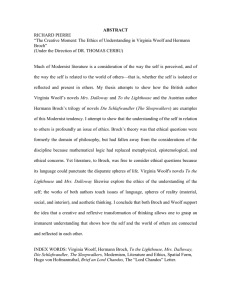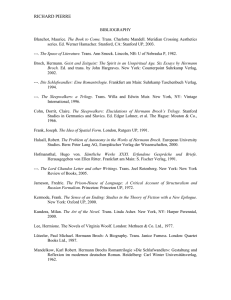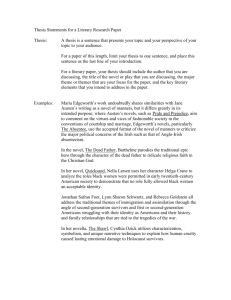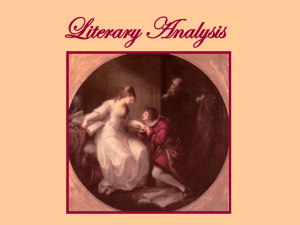Document 10761844
advertisement
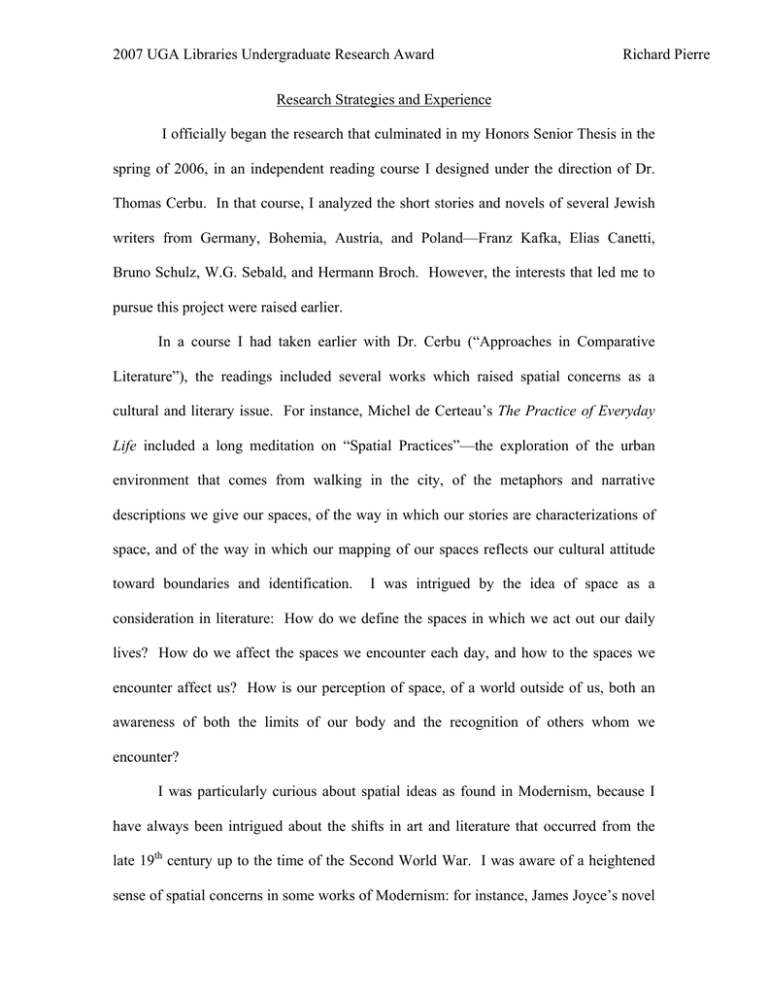
2007 UGA Libraries Undergraduate Research Award Richard Pierre Research Strategies and Experience I officially began the research that culminated in my Honors Senior Thesis in the spring of 2006, in an independent reading course I designed under the direction of Dr. Thomas Cerbu. In that course, I analyzed the short stories and novels of several Jewish writers from Germany, Bohemia, Austria, and Poland—Franz Kafka, Elias Canetti, Bruno Schulz, W.G. Sebald, and Hermann Broch. However, the interests that led me to pursue this project were raised earlier. In a course I had taken earlier with Dr. Cerbu (“Approaches in Comparative Literature”), the readings included several works which raised spatial concerns as a cultural and literary issue. For instance, Michel de Certeau’s The Practice of Everyday Life included a long meditation on “Spatial Practices”—the exploration of the urban environment that comes from walking in the city, of the metaphors and narrative descriptions we give our spaces, of the way in which our stories are characterizations of space, and of the way in which our mapping of our spaces reflects our cultural attitude toward boundaries and identification. I was intrigued by the idea of space as a consideration in literature: How do we define the spaces in which we act out our daily lives? How do we affect the spaces we encounter each day, and how to the spaces we encounter affect us? How is our perception of space, of a world outside of us, both an awareness of both the limits of our body and the recognition of others whom we encounter? I was particularly curious about spatial ideas as found in Modernism, because I have always been intrigued about the shifts in art and literature that occurred from the late 19th century up to the time of the Second World War. I was aware of a heightened sense of spatial concerns in some works of Modernism: for instance, James Joyce’s novel 2007 UGA Libraries Undergraduate Research Award Richard Pierre Ulysses compresses is temporal span into a single day, which allows for an encyclopedic and microscopic analysis of spatial practices; another example may be found in the Cubist movement, which shows a particular attention to spatial perception by portraying subject matter from multiple points of view in a single painting. Thus I was led to consider these ideas in the works of several Modernist authors working between the two World Wars. I chose authors from several nations and traditions because of my interest in Comparative Literature. My work in the directed reading course with Dr. Cerbu allowed me to freely explore my research question from several angles: I initially began by looking at Magical Realist elements in Kafka’s stories in order to see what bearing these elements had on spatial concerns; later I looked at mythological notions of space in Bruno Schulz’s short stories; I considered memories of spaces in W.G. Sebald’s Vertigo; and finally, I came to read Hermann Broch’s novel Die Schlafwandler (The Sleepwalkers). Broch’s novel seemed to embody the question that had surfaced as most important to me—how is our perception of space, of a world outside of us, both an awareness of both the limits of our body and the recognition of the other people which we encounter? Broch’s novel (actually a trilogy of three novels) portrays three different time periods (1888, 1903, and 1918) and examines the shifting values and value conflicts of each. The characters in his novel portray the various possibilities of reacting to this shift: maintaining tradition and belief in traditional values; ignoring the presence of traditional values and living by anarchic principles; or being value-free and relying only on creativity in decision making. It seemed clear to me that the issues in The Sleepwalkers concerned the way in which spatial perceptions influence our relationships with others— an idea which has immediate ethical connotations. 2007 UGA Libraries Undergraduate Research Award Richard Pierre Dr. Cerbu suggested that Virginia Woolf’s novel To the Lighthouse might make a good complement to Broch’s The Sleepwalkers, and to the issues I was interested in. Thus, during the summer of 2006, I read To the Lighthouse and began making initial notes towards an Undergraduate Thesis. I met with Dr. Cerbu over the summer to discuss the readings and plans for the thesis. Towards the end of the summer, I also read Virginia Woolf’s novel Mrs. Dalloway to allow for a broader consideration of her writing. As the fall semester began, I completed my final research and began writing the thesis. I completed the work in December of 2006 and followed with a defense conference with Dr. Cerbu and my thesis Reader, Dr. Katarzyna Jerzak of the Comparative Literature Department. In my thesis, “The Creative Moment: The Ethics of Understanding in Virginia Woolf and Hermann Broch,” I explore the ways in which figures orient themselves to one another, how they “locate” themselves in their inner and outer spheres of reality. By examining the conflicts inherent in this, I attempt to show that the understanding of the self in relation to others is profoundly an issue of ethics. I conclude that both Broch and Woolf support the idea that a creative, reflexive transformation of thinking allows one to grasp an immanent understanding of how the self and the world of others are connected and reflected in one another—that through reciprocity (exstasis), one reaches an understanding of one’s relation to others. Throughout my research process, the University of Georgia Libraries proved to have invaluable resources. Searching for secondary sources needed for my research was facilitated by the GIL system. I was able to locate sources which were out-of-print and which, without the Library, would have been extremely difficult or impossible to find (such as Mandelkow’s Hermann Brochs Romantrilogie). Furthermore, as my thesis deals 2007 UGA Libraries Undergraduate Research Award Richard Pierre with German-language works, having these works available at the Main Library allowed me to easily research texts which can be difficult to find in America in the original language. For example, when I needed to check a phrase from Hugo Hofmannsthal’s “Lord Chandos Letter” which I wished to show had had a direct influence on Hermann Broch and his use of the term “sleepwalker,” I needed to check the phrase against Hofmannsthal’s original “Brief an Lord Chandos”—which I was fortunately able to locate in Hofmannsthal’s Sämtliche Werke XXXI located in the Main Library’s German holdings. I found that simply having large holding of materials available in the Library facilitated my research—if I had something in mind that needed a reference, simply by browsing, I could often find what I needed, or something to point me in the right direction. I was also able to use online sources (such as JSTOR, Project Muse, and the on-line MLA Bibliography) as a means of locating reliable information. For instance, the GALILEO databases led me to an article by the Broch scholar Judith Ryan; the article then led me to her The Vanishing Subject, a book which contributed greatly my project. For all of these reasons, I feel fortunate to have had access to the University of Georgia Libraries during the course of my research and the writing of the thesis—one of the most important realizations I have gained from my research experience is the importance of a library as a scholarly tool, and the experiences I have had in using the library in my research will serve me well as I continue my career.
